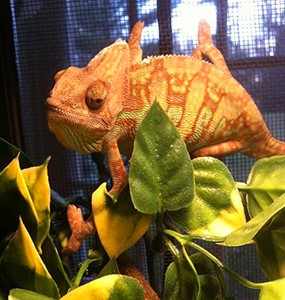
Welcome to our new blog by Dr. Laurie Hess! She’ll be contributing regularly on the Pet Health Network about all things exotic.
As an exotic animal veterinarian, I am frequently asked why anyone would want an exotic pet (bird, rabbit, guinea pig, chinchilla, ferret, lizard, turtle, snake, hedgehog, sugar glider, or other unique animal) over a dog or cat. My answer to this question is that there is no single answer. Of course, there’s nothing wrong with cats and dogs; I love these animals and have several of my own, in addition to my exotic family members. It’s just that there are so many reasons to have an exotic pet that it’s hard to limit my responses. But here are a few very important reasons to own an exotic pet:
1. Exotic pets are so different from cats and dogs that owning one can be an incredible learning experience.
Exotic pets are fascinating. With their unique behaviors and complicated social interactions, both with each other and with us, they really can teach us all sorts of new information. But their gregariousness can be a double-edged sword for an owner; these exotic pets have very specific social and environmental needs, and before you embark upon the journey into exotic pet ownership, you should be sure to learn about the needs of the exotic pet species you are considering so that you don’t end up with a pet whose requirements are more than what you bargained for. 2. Many exotic species don’t take up much space.
2. Many exotic species don’t take up much space.
For many city dwellers that live in cramped, tiny apartments, a pet such as a dog or cat that spends most of its time outside a cage and requires a lot of space just isn’t an option. A small mammal (such as a hamster, gerbil, guinea pig, chinchilla, or rat) or even a reptile or small bird that can live in a fairly small cage might be a more feasible choice. Ask anyone who owns one of these smaller exotic species, and they’ll tell you that these pets can provide the same love, companionship, and satisfaction that a larger dog or cat can offer. Remember, good things come in small packages.
3. Exotic animals can be great for people with pet allergies.
Although many people would love to have a pet dog or cat, they often cannot, because they or their family members have allergies to the dander that furry pets carry on their coats. All is not lost for these people, however; they can still have a loving pet if they choose a reptile (such as a lizard, turtle, tortoise, or snake) that has neither hair nor dander on its skin. They might even be able to have a hairless rat or guinea pig if they are not severely allergic, and if they are not allergic to feathers, they might also be able to own a bird. So don’t despair if you’re allergic to hair!
4. Most exotic pets don’t need to be walked.
For many busy pet owners who work long hours, owning a dog that needs to be walked every few hours is not an option, because they can’t get home to do it and don’t have the finances to pay a dog walker. The good news is that most exotic pets don’t need to be walked; while exotic pets do need to be handled to be socialized and to have a good quality of life, most birds, small mammals, and reptiles can adapt to humans’ busy schedules when it comes to “time out of cage.” In general, as long as you make some time to interact with these animals every day, for most exotic species, the time you make available is flexible.
5. Many exotic pets live a long time.
People frequently comment that they could never own a pet because they’d get so attached to it that they couldn’t bear losing it. Of course, no pet – exotic or otherwise – lives forever. However, certain species, such as large birds and some reptiles, can live for 20-40 years or more in captivity. Certainly, these animals must be taken care of properly – fed appropriate diets, housed according to the species’ needs, and given regular medical check-ups – to live to their genetic potential. But for many people who have grieved over the loss of a relatively short-lived pet such as a dog, cat, small mammal, or small bird, the prospect of having a potentially very long-lived pet is appealing. Once again, this longevity can be either a blessing or a curse in that before you rush out to buy or adopt a new reptile or large bird, you should seriously consider whether you have the time, lifestyle, and finances available to support a pet that might outlive you!
If you’re not already convinced of the reasons you should own an exotic pet, please let me know, and I’ll come up with another dozen or so reasons. The fact is, when owned responsibly by people who take to the time to provide for their special dietary, environmental, and social needs, exotic pets of all kinds can make loving, interactive, fascinating companions!
If you have any questions or concerns, you should always visit or call your veterinarian – they are your best resource to ensure the health and well-being of your pets.
